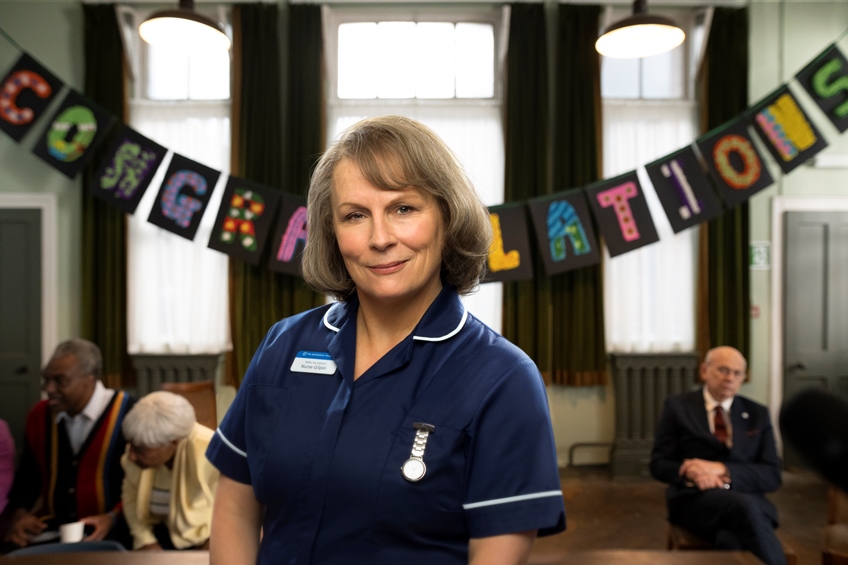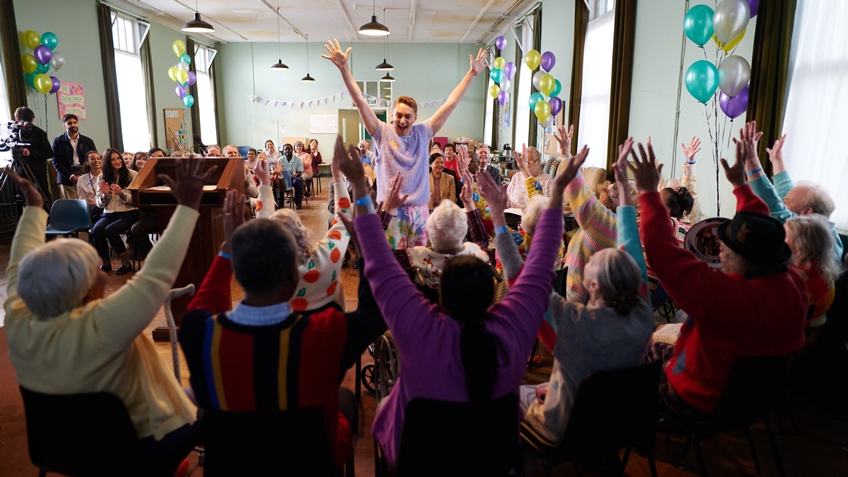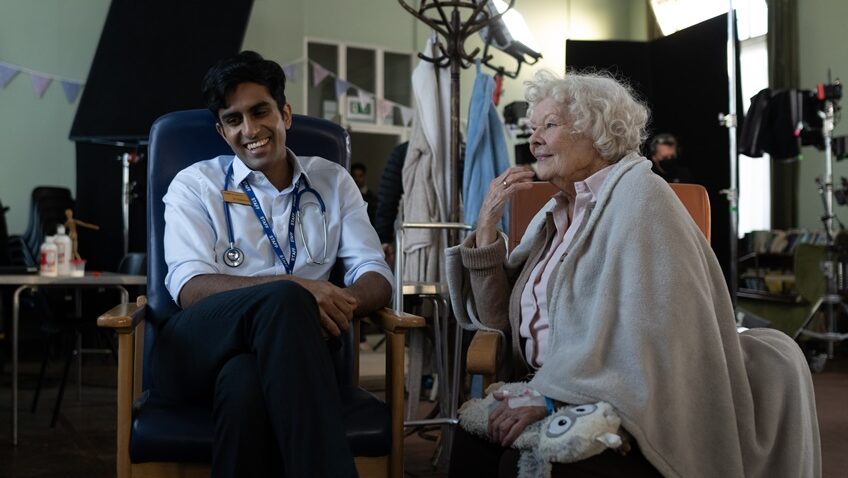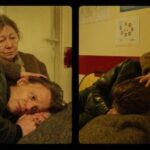Joyce Glasser reviews Allelujah (March 17) Cert 12A, 98 mins. (This review may contain spoilers)
When Alan Bennett’s play Allelujah hit the Bridge Theatre in the summer of 2018, it was both a nod to Peter Nichols’ 1969 black comedy, The National Health and a vehicle for Bennett’s inimitable way of letting darkness seep through the veneer of a gentile comedy. In his heartfelt play about the government’s betrayal of the NHS you couldn’t find a nicer, more upstanding and undemanding group of patients, albeit all White, or a more dedicated doctor (Asian) if you tried.
Then came Covid, and the NHS had even bigger problems. Screenplay writer Heidi Thomas’s adaptation of Bennett’s play tacks on a coda in a Covid ward that comes out of left field; but is not the only jarring scene in Nicholas Hytner’s film. A terrific, if underused, cast of A list British actors help ease the pain.
The setting is a geriatric ward in a cradle-to-grave Yorkshire hospital affectionately called “The Beth”. It’s short for The Bethlehem Hospital, founded in 1879, as a film crew called in by the threatened hospital’s Chairman, Mr Salter (Vincent Franklin), are told. Salter’s PR efforts to bring the hospital’s fight for survival to the attention of the locals and politicians is a great idea, until it isn’t. For one thing, even with a script a film can go horribly wrong, but the fictious crew does not have one and they film whatever turns up, including some “inconvenient truths”.
At the sound of “The Beth”, some viewers will think back to St Mary Bethlehem or Bedlam, the “madhouse” depicted by William Hogarth in A Rake’s Progress, or in the 1946 film starring Boris Karloff – in which Hogarth is given a writing credit. But the only thing mad in Bennett’s view, is the decision to close down The Beth.

It is the kind of place where neglected old people left to rot in substandard care homes can only dream about, with spotless rooms, loving care, lots of space, a choir and wards given names like Dusty Springfield, which are easier to remember. Of course, this isn’t a care home, and Sister Gilpin (Jennifer Saunders) must ensure that once a patient is ready to move on, he or she does so.
Dr Valentine Young (Bally Gill) narrates the film in an opening confessional, and in the coda referred to above. An immigrant to the UK whose family remains in India, the doctor changed his name to fit in and tells us over and over again how much he loves caring for old people. He feels he shares this passion with the overzealously efficient and highly organised Sister Gilpin, who is hands on and manages the ward down to the smallest detail. Both appear married to their jobs. At their side is the diligent, enthusiastic Nurse Pinkney (Jesse Akele), the future and smiling face of the NHS. If you could choose one nurse to have around you it would be Pinkney.
The Beth is one of the casualties of hotshot management consultant Colin Colman (Russell Tovey, The Good Liar, The Pass), who believes that big is bad and generalist is old fashioned. What a curious shortcoming and missed opportunity that Colman, the only character who develops during the film, espouses paper thin, poorly articulated arguments both for closing The Beth and then, later, against it.
Tovey’s history with Bennett goes back to the stage production of The History Boys and the film adaptation. Tovey is openly gay and here his character’s sexual orientation is used to strengthen the estrangement between him and his father Joe Colman (David Bradley, Argus Filch in the Harry Potter film series), a retired miner and widower after 50 happy years of marriage. And he just so happens to be a patient in the hospital his son wants to close down.
Their differences do not stop there. Colin went to University, is a consultant to the Health Minister, goes to opera, isn’t sure if he can commit to his boyfriend in London and does not speak like a miner’s son. But you can tell what Bennett, who did pretty well out of his literary pursuits, thinks about children levelling up. It turns out that Colin is not only a bad consultant (he changes his flimsy position after the government has committed money and time to his closure programme), but he only goes to the opera to accompany the Health Minister and does not really like it.

Back at The Beth, each of septuagenarian and octogenarian actors playing the patients gets a few one liners, but only Joe Colman is characterised in any meaningful way. Marlene Sedaway, 85, who is still making stage appearances, plays Lucille, whose father had a chain of confectionary stores. Julia McKenzie – who starred in the original London productions of Sondheim’s Follies and Into the Woods – is just a patient without a name.
Higher up the ladder is Derek Jacobi, playing former English professor and scholar Ambrose who Dr Valentine consults on reading material to improve his vocabulary but really, we suspect, to boost Ambrose’s morale. Judi Dench is Mary Moss, the self-effacing librarian who is more excited about the marginalia – what people doodle in library books – than the books themselves. This makes her the perfect person to capture the ward’s minutiae with an iPAD, a therapy of dubious legality that ultimately derails Mr Salter’s campaign. Old people do the darndest things.
Darker notes creep in when a middle-aged couple squabble because their nonagenarian mother dies three months short of a tax deadline, and they want to sue the hospital. Dr Valentine is tacitly surprised at the sudden death, so soon after Mr Jessup’s (a patient we only hear about). Ambrose’s fears and frustrations, Joe Colman’s reluctance to have his wedding ring removed on health grounds and the general process of ageing are a few depressing glimpses of ageing that are juxtaposed with humorous scenes or frequently flat one-liners.
Granted, this is not meant to be a film about ageing as was Gaspar Noé’s brilliant, pungent, 2022 feature Vortex. Nor is it about assisted dying, as was François Ozon’s superb 2022 release Everything Went Fine.
But Bennett has nothing new to say about these subjects, although they preoccupy most of the cast. The subject is the NHS but here, too, the polemic is surprisingly botched in the writers’ own goals. When Dr Valentine breaks the fourth wall to look us in the eye and declare that the NHS is “love itself” we have just witnessed a serial killer being hauled off the ward.




